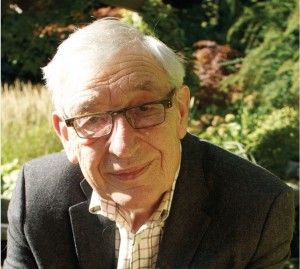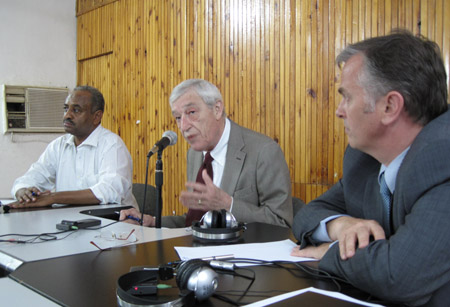A Tribute to Richard Simeon
October 15, 2013

It is with great sadness that we have learned of Richard Simeon‘s passing. Richard was a wonderful friend and colleague to many people in our department. He was an exceptional scholar and a superb mentor to junior colleagues and students alike. I am grateful to David Cameron and Grace Skogstad, two of his long-time friends and colleagues, who have written the following appreciation of Richard.
Acting Chair

Photo Courtesy of: Forum of Federations
Richard Simeon, one of Canada’s preeminent political scientists, has died at the age of 70. A highly prolific and internationally recognized scholar, Richard was also an unfailingly supportive colleague, an inspiring teacher and mentor, and friend to all who knew him.
Although his interests were broad-ranging—indeed, there was very little that he did not find interesting–Richard is best known for his contribution to Canadian and comparative federalism. His study of federalism and decentralized governance spanned his life, beginning with his undergraduate training at the University of British Columbia and his graduate studies at Yale University where he earned his PhD in 1968. His prize-winning PhD thesis for Yale, published as Federal-Provincial Diplomacy in 1972, was described by the prize jury as `a classic whose influence stretches far beyond Canada’s borders.’ A steady stream of publications on federalism and other matters—some 20 books, 100 articles and book chapters—followed to frame both academic debate and public policy discussion.
Following the election of the Parti Quebecois in 1976, Richard was deeply engaged with the federal and constitutional crisis that unfolded. During this time, he taught Political Studies at Queen’s University (1968-1991) and directed its Institute of Intergovernmental Relations (1976-1983), before joining the University of Toronto in 1991 as a Professor of Political Science and Law. His academic preoccupation with the national unity debate was combined with service on the Ontario Advisory Committee on Confederation and his role as an occasional adviser on constitutional matters to Ontario premiers Davis, Peterson, and Rae.
Throughout the heated and polarized national unity debates, Richard sought to help adapt Canada’s political and constitutional order to a society that was rapidly changing, both in Quebec and in the rest of Canada. Disturbed by the exclusion of Quebec from the Constitution Act of 1982, he was an an ardent supporter of, and advocate for, the Meech Lake Accord, and greatly disappointed when it failed. As Richard reflected recently `My view then was not so much to take sides or go to war for national unity, but rather to help promote mutual recognition and understanding across the linguistic divide. This search for compromise, consensus, and accommodation, more than any partisan position, was and is my core belief and has shaped my responses not only to many aspects of Canada’s linguistic, regional, and Aboriginal differences, but also to many international cases as well.’
Richard’s academic and public policy contribution extended well beyond Canada’s national unity and constitutional debates. He served as a research coordinator for the Royal Commission on the Economic Union and Development Prospects for Canada (1983-85), for which he produced four published volumes. From 1985 to 1991, he was the Director of the School of Public Administration at Queen’s: a position that had the fortuitous outcome of bringing him into contact with MaryEtta Cheney who later became his wife. The first non-lawyer appointed to the Ontario Law Reform Commission, Richard served as its vice-chair from 1989 to 1995.
His expertise was also sought out internationally. He advised the newly elected democratic government of post-apartheid South Africa on public administration. Under the auspices of the Forum of Federations, Richard went to Jordan, Sudan, Ethiopia, and Kenya to discuss the potential of federalist ideas. He also served as an academic adviser to the Club of Madrid on questions of regional integration in Spain and Scotland.
His contribution earned him awards and recognition. Harvard University invited him to serve as its Mackenzie King Fellow, in 1998 and again from 2006 to 2008. His colleagues elected him to be a Fellow of the Royal Society of Canada in 2004. And in 2010, he was awarded the Daniel J. Elazar Award by the American Political Science Association for `a lifetime of distinguished scholarship on federalism and intergovernmental relations.’
Notwithstanding his retirement in 2010, Richard remained intellectually engaged to the end of his life. He leaves a formidable legacy: one of scholarship and of an intellectual spirit that recognizes the need to be committed without being ideological, and the need to build bridges across divisions. His colleagues, his friends, and his family—whom he always described as `at the heart of it all’—lament his passing.
The University of Toronto will be lowering its flag to half mast on Thursday, October 17th in memory of Richard Simeon.
For more information please visit the following pages: